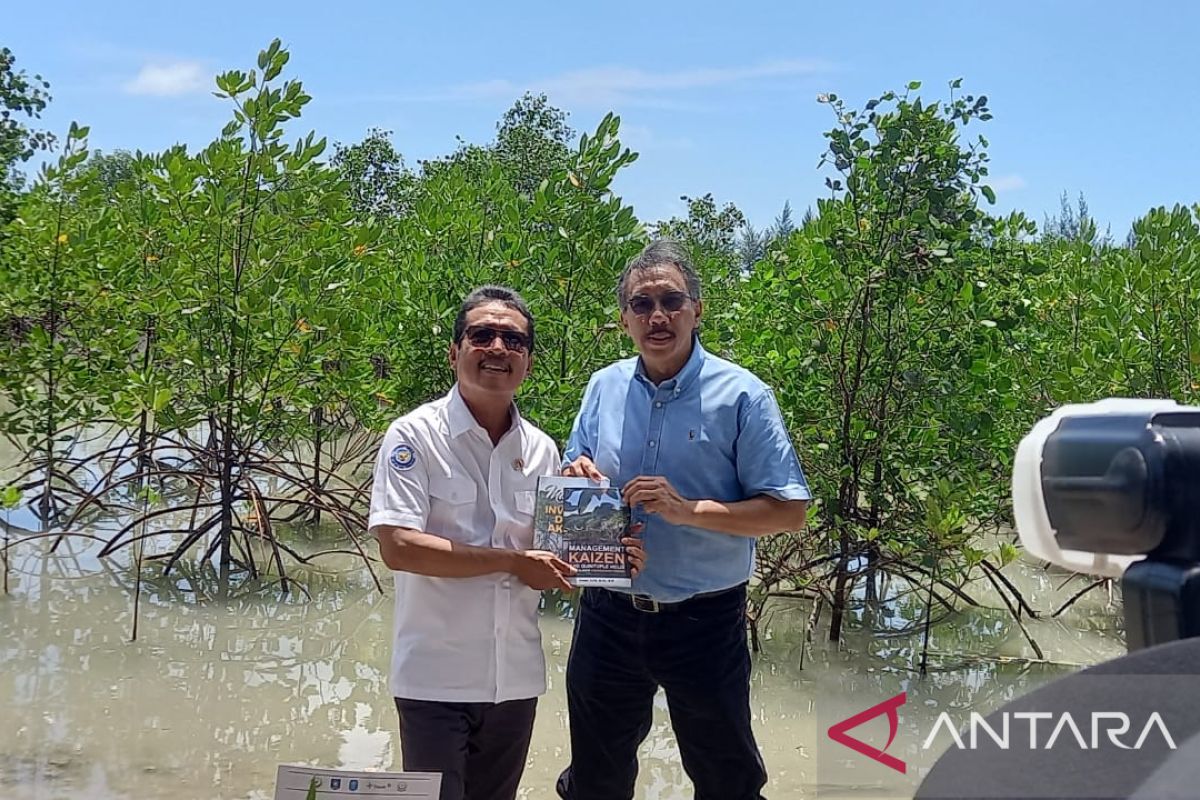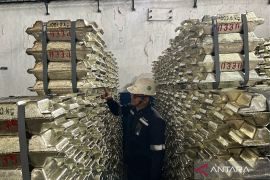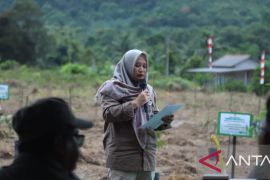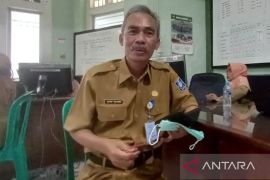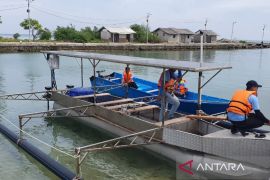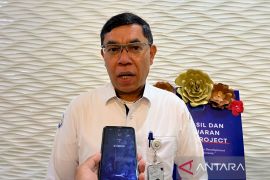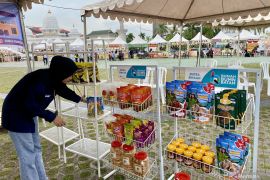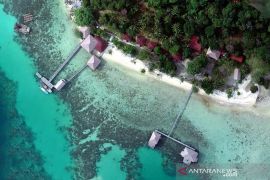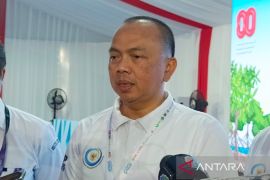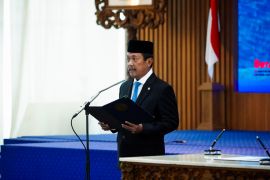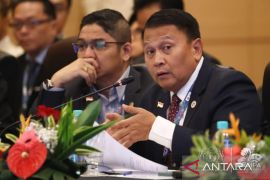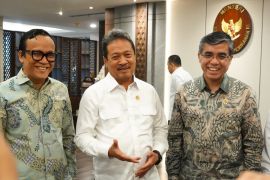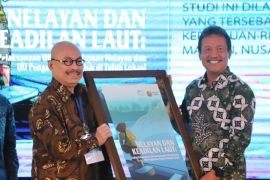There are several issues in national sea management that could place the sustainability of marine life and resources at risk. Moreover, it compromises the livelihoods of fishermen, supply of seafood, and economic growth, all of which are highly dependent on sea.
Hence, there is a need to create a healthy, secure, and productive marine life for the sake of national welfare.
Maritime Affairs and Fisheries Minister Sakti Wahyu Trenggono stated that currently, the ministry is focusing on five blue economy-based programs to maintain the marine ecosystem, ensure equity in growth development of coastal communities, and develop public welfare.
Blue economy prioritizes marine ecosystem sustainability as a priority in developing marine economy sectors.
The five programs in question include expanding the marine conservation area up to 30 percent; quota-based measured fishing; sustainable fish cultivation; managing and monitoring shores and small islands; and cleaning up plastic waste from sea through programs, such as Love Sea Month, also with participation from fishermen.
According to Government Regulation in Lieu of Law Number 2 of 2022 on Job Creation, one of the requirements to establish business is permit on suitability between conducted activity and the space (KKPRL). Everyone who makes use of the sea consistently within the waters or jurisdiction area is required to possess a permit of Use of Sea Space from the central government.
The permit aims to ensure that they use the space as intended in the marine space management. It is the basic instrument for the government to control progress of the blue economy in the management of marine resources.
The permit is granted after review that takes into account spatial planning, ecosystem sustainability, and national, public, and traditional fishermen's interests. They also consider the scale of business, supporting capacity, as well as risks and impacts for the environment.
After Government Regulation Number 21 of 2021 on spatial planning was released, the ministry issued as many as 95 KKPRL permits for several activities in Bangka Belitung Province's waters. Of the figure, 85 are agreements and 10 are confirmations.
The permits are for various types of businesses. For instance, it is for fishing facilities, underwater cables, special terminal, and mines, including for lead mining by PT Timah Tbk.
Minister Trenggono commended the Bangka Belitung Islands Government and PT Timah Tbk for their commitment in prioritizing sustainability in collecting mineral resources under the waters as well as their efforts to revitalize the mangrove ecosystem with the general public.
"Our hope is for the manifestation of healthy sea for a strong economy that ensures public welfare," the minister stated during his visit to Bangka Belitung.
Acting Governor of Bangka Belitung Ridwan Djamaluddin stated that the KKPRL permit demonstrated that the company abides by the regulations. The ministry, on the other hand, follows up through keen monitoring to ensure that it goes accordingly.
Blue economy ensures that all sectors can co-exist, as it emphasizes harmony between mining, fisheries, tourism, and environmental conservation.
"(This is) because in essence, the lead is not mined for the current generation but also for the generation in the future," Djamaluddin remarked.
Main director of PT Timah Tbk Achmad Ardianto affirmed that the company adopts an integrated system in its mining activity, both on land and at sea. It also adopts good mining practices to minimize environmental impacts that can arise from mining activities.
The government has tasked the company with high-quality lead mining. On the other hand, PT Timah Tbk has realized that lead mining technology needs to be improved. Thus, they are faced with challenges, including in ensuring safety of their workers and sustainability of the environment.
Lead is a mineral whose demand continues to increase each year. As the second-largest lead mining company globally, PT Timah Tbk will set the pace of global technology development.
Empowering the coastal community
To balance out mining activities, the company conducts sea reclamation by setting up artificial reefs, which come in various shapes, such as coral garden, as well as by restocking squids and scyllas and monitoring seawater quality.
Moreover, the company pursues the community empowerment program. PT Timah tbk is part of the Bangka Belitung community, and the lead mining industry has become one of the economic sources for the people.
Thus, the company is committed to improving its performance and management so as to proffer benefits to Bangka Belitung, in particular, and Indonesia, as a whole.
With support from the ministry, the company is confident of being able to realize an inclusive lead mining sector, through ways, such as ensuring secure mining while concurrently being beneficial to the people.
"Of course, we want for this inclusivity to grow better each day, for the sake of national and state advancement and public welfare. We want to grow and develop for the people," Ardianto noted.
Ocean Accounting
Expert on Ocean Accounting from the Bogor Agriculture Institute, Prof. Akhmad Fauzi, stressed the need for Bangka Belitung Islands to adopt ocean accounting to gauge the potential of marine resources of the area.
Ocean accounting is an instrument to control or see the progress of balanced management between ecological and economical aspects of a region. It can be used as a tool to review and evaluate resources in Bangka Belitung Islands Province.
"What we can use, how many can be captured. This is one of the important instruments because without ocean accounting, on evaluation, we have no idea of what we have and how to use it," Fauzi elaborated.
Fauzi stated that he and his team had formulated two inclusive solutions to integrate complex activity through a comprehensive scientific basis. One of the ways is through seven variables, known by the acronym RESPECT.
The R stands for regulatory, as in, the business should be accountable before the law. E stands for economic variation that means the lead, fish, or residual items can be used for public welfare.
S stands for socialization, which has to be inclusive. People will benefit from the mines, mangroves, and many more. P means politically supported. If there was no support, many conflicts would have been sparked.
Meanwhile, E stands for environmentally acceptable. It should not exceed certain limits that have been set. The C in the acronym means community responsibility, and the public is expected to become prosperous through the activity. The last one, T, means technology that is not destructive.
"These principles will support what is known as blue justice, and blue governance, as well as blue parameters," he noted.
The expert proposed a scheme of team on sustainability of lead in Bangka Belitung Province. It is expected that once the lead of the region is truly spent, the results can be tangible for the future generations.
The spirit is in line with the blue economy concept, which is the utilization of resources backed up with environmental knowledge, to support economic growth, welfare, livelihood, and environmental conservation for current times and in the future.
Related news: Marine Ministry focusing on five blue economy programs
Related news: Indonesia readying legal foundation for blue economy implementation
Editor: Rahmad Nasution
Copyright © ANTARA 2023
